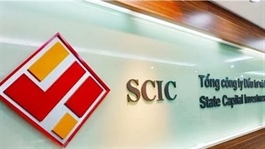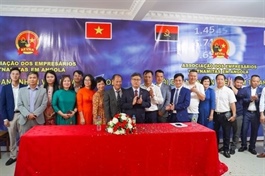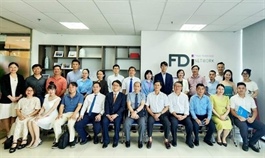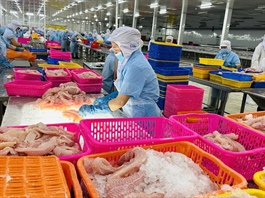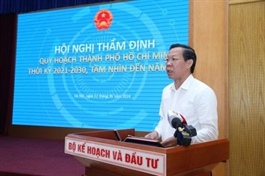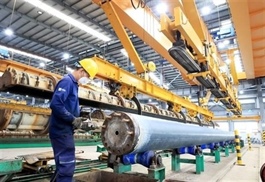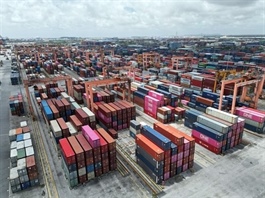Overhaul demanded to slow cost burdens
Overhaul demanded to slow cost burdens
Businesses are seeking support to help them prosper as they continue to deal with regulation complexities, among other issues.

At last week’s meeting between the Ministry of Planning and Investment (MPI) and various associations and businesses, Nguyen Hoai Nam, deputy general secretary of the Vietnam Association of Seafood Exporters and Producers (VASEP), said that seafood processing enterprises are being subjected to a corporate income tax rate of 20 per cent.
“After numerous recommendations, the Ministry of Finance (MoF) has issued an official dispatch guiding the application of the 15 per cent tax rate, but tax authorities in localities make it difficult for businesses in applying this regulation,” Nam said. “Therefore, we recommend the MoF amends this regulation in legal documents such to prevent tax officials from frustrating enterprises.”
In addition, new regulations on guiding the Law on Fisheries, and on sanctioning administrative violations in the fisheries sector, are causing many obstacles to exporting, Nam claimed.
“Regulations to not mix imported aquatic raw materials with domestically-exploited materials have prevented shipments from being exported because both authorities and businesses cannot agree on the concept,” Nam said. “The VASEP made proposals on this to the Ministry of Agriculture and Rural Development nearly a month ago, but is yet to receive any response.”
Additionally, seafood businesses are struggling because transport costs are high. Despite setting a yearly turnover target of $10 billion, seafood exports only reached $3.6 billion by the end of May.
Ngo Khac Le, vice chairman of the Vietnam Logistics Association, said that logistics costs had surged significantly recently, while all of Vietnam’s import and export goods were operated by foreign shipping companies.
Shipping companies are collecting numerous surcharges for goods at seaports, with prices and types of surcharges decided by the shipping companies without any discussion or agreement from customers.
“Because of not directly negotiating and signing contracts, the Vietnamese exporters have to accept the surcharges given by the shipping company,” Le said.
Since the beginning of 2024, foreign shipping lines have simultaneously announced an increase of 10-20 per cent in terminal handling charges for each service.
“When adjusting fees and surcharges, foreign shipping lines need to publicise price changes for only 15 days before applying new fees, without any inspection or explanation, according to regulations for publishing of fees and surcharges of ocean container shipping and seaport charges,” Le added.
He recommends authorities to add surcharges for container shipping services by sea to the list of goods and services subject to price declaration to complete the price management mechanism and other types of surcharges for goods at seaports.
Truong Van Cam, vice chairman and general secretary of the Vietnam Textile and Apparel Association, pointed out some regulations that are making it difficult for the process of forming the supply chains, especially regulations on on-site imports and exports.
“Specifically, local enterprises that do on-site exports for export-oriented manufacturing enterprises must pay export tax on exported products. At the same time, businesses doing on-site imports must also pay import tax on on-site imported products. Thus, both businesses must pay tax on an object of goods only,” Cam said.
He added said that orders are increasing, and unit prices are gradually going up.
“There are some positive signals, but we are not entirely optimistic. It will be very difficult to achieve the garments and textiles industry’s export target of $44 billion, especially with these burdens,” he said.
Do Thi Thuy Huong from the Vietnam Electronic Industries Association said that numerous Vietnamese businesses in the domestic supply chain, processing and supplying goods to foreign businesses were suffering losses because of on-site export regulations.
What is more, many businesses in the electronic industry have to rent production and business premises, while land rent fees are surging.
“When the lease expires, contracts are renewed and signed. However, land rent fees are hugely different from previous years. Some of them reported paying a 10-fold increase in land rent in just two years. How can they suffer this?” Huong said.
She also said that the growth of businesses in the electronics industry was good in the first four months of the year, instead of the negative growth seen in the same period in 2023.
“However, amid declining global consumption demand, some businesses have lost traditional orders. Traditional processing orders have reduced by 50-80 per cent in electronic manufacturers, and some of them have to close down production departments that had been processing orders over the past 5-7 years,” Huong said.
She proposed maintaining current on-site export regulations, as well as on-site import and export customs procedures, and has requested a meeting with the General Department of Vietnam Customs on the issue.
The MoF has proposed to abolish certain details on implementing measures of the Law on Customs regarding procedures, inspection, supervision and control. On-site import and export activities will not require customs procedures for trading between local enterprises with foreign organisations and individuals that are not present in Vietnam, and are designated by foreign traders to deliver and receive goods with other businesses in Vietnam.
Huong has also proposed a training programme, especially on retraining and upgrading workers in the electronics industry, to access the semiconductor industry, seize opportunities, and look for new orders.







